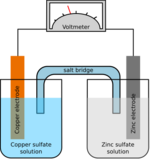Engineering:Nanopore battery
A nanopore battery is a rechargeable battery that is a composite of billions of nanoscale batteries formed within the pores of a substrate.[1]
The space inside the holes is so small that billions of pores combined equal the volume of a grain of sand. Each pore's diameter was some one eighty-thousandth the width of a human hair.[1]
Construction
In 2014 a demonstration device was made from a ceramic sheet made of anodic aluminum. It held two vanadium pentoxide nanotube electrodes separated by an electrolyte that carried the electrical charge between the two. The current collector was made of ruthenium. The individual batteries are connected in parallel.[2]
The V2O5 is prelithiated at one end to form the anode, with pure V2O5 at the other end to form the cathode. The battery asymmetrically cycles between 0.2 V and 1.8 V.[3]
Performance
The capacity retention of this full cell (relative to 1 C values) is 95% at 5 C and 46% at 150 C, with a 1,000-cycle life.[3] A demonstration device was fully charged in 12 minutes and recharged thousands of times.[1]
Implications
The system uses an electrochemical regime in which ion insertion and surface charge mechanisms for energy storage become indistinguishable. It can serve as a vehicle for studying ion transport limits in dense, nanostructured, electrode arrays.[3]
See also
References
- ↑ 1.0 1.1 1.2 Coxworth, Ben (November 11, 2014). "Tiny battery is made from lots of even tinier "nanopore" batteries". Gizmag. http://www.gizmag.com/nanopore-tiny-battery/34694. Retrieved February 23, 2015.
- ↑ "A battery made up of billions of nanoscale batteries". Kurzweil.net. November 11, 2014. http://www.kurzweilai.net/a-battery-made-up-of-billions-of-nanoscale-batteries. Retrieved February 23, 2015.
- ↑ 3.0 3.1 3.2 Liu, C.; Gillette, E. I.; Chen, X.; Pearse, A. J.; Kozen, A. C.; Schroeder, M. A.; Gregorczyk, K. E.; Lee, S. B. et al. (2014). "An all-in-one nanopore battery array". Nature Nanotechnology 9 (12): 1031–1039. doi:10.1038/nnano.2014.247. PMID 25383515. Bibcode: 2014NatNa...9.1031L.
 |

